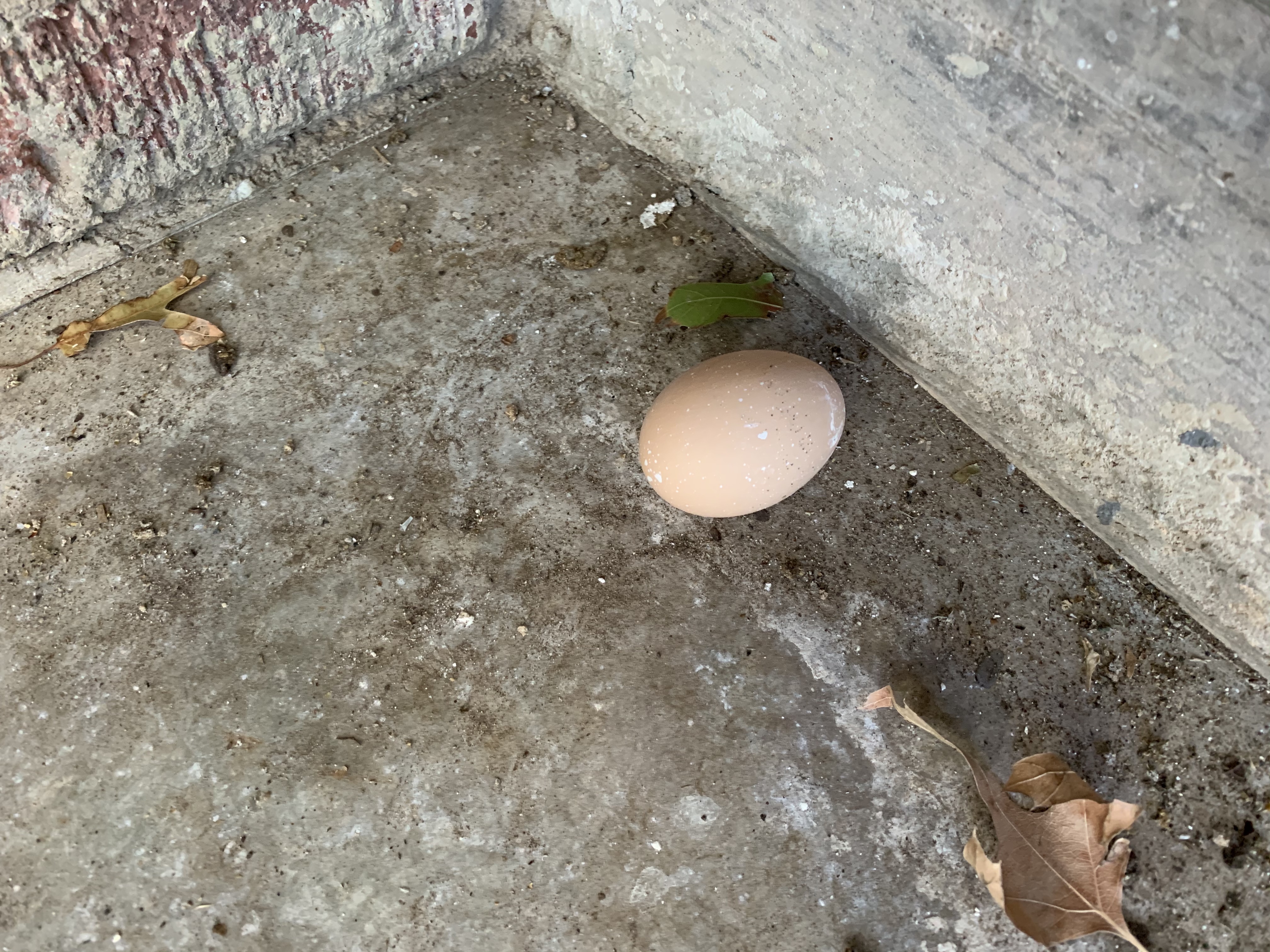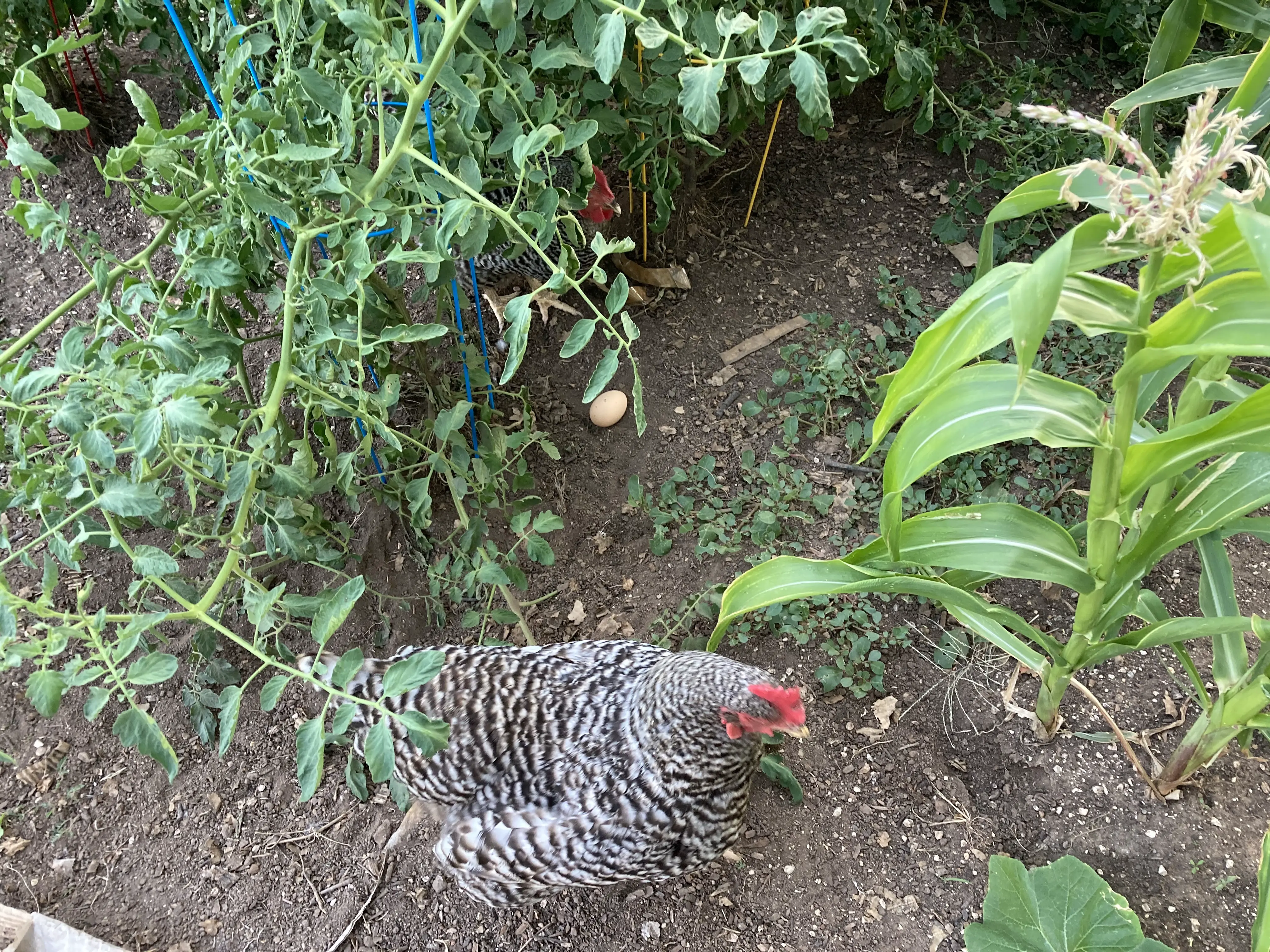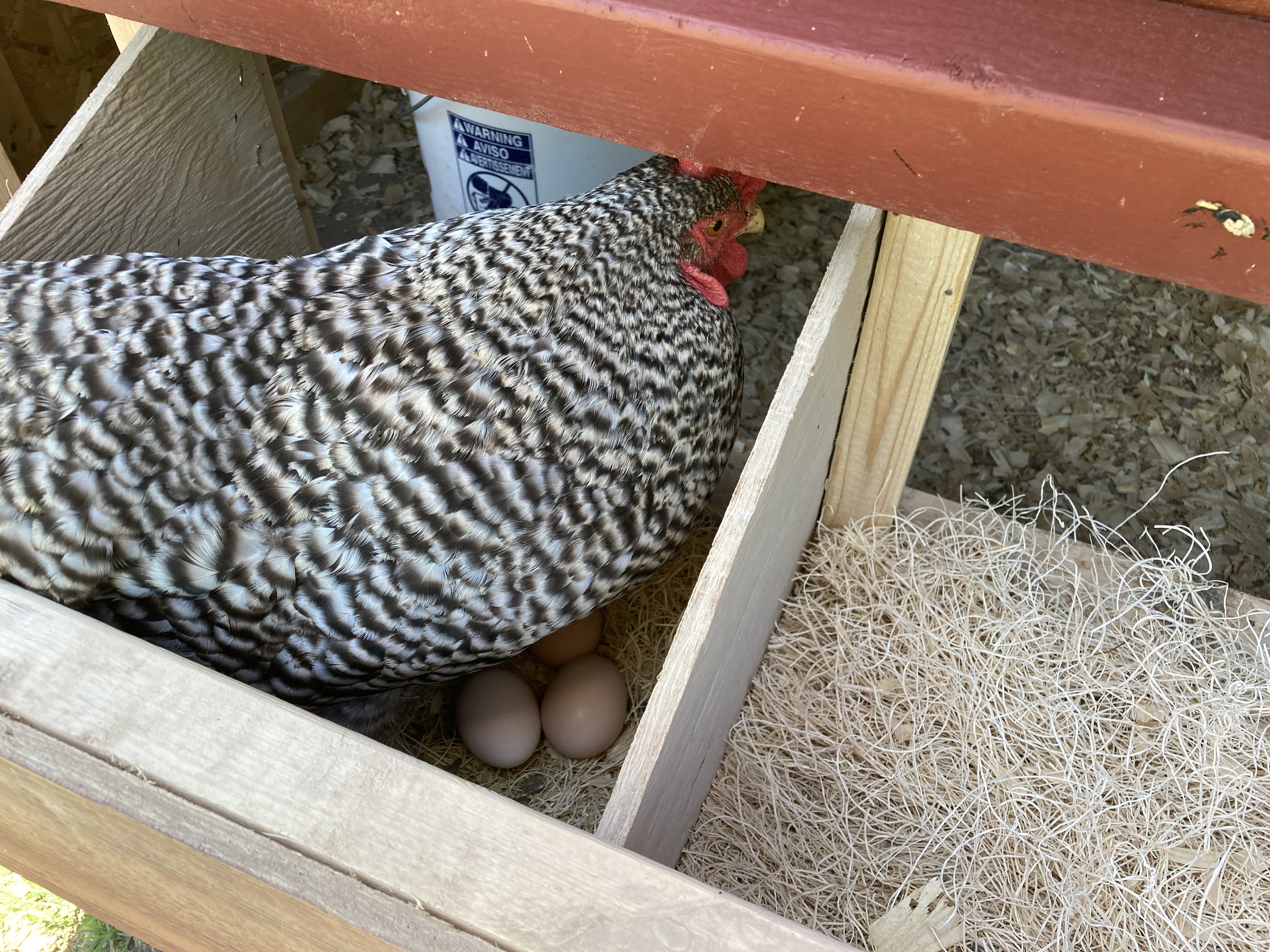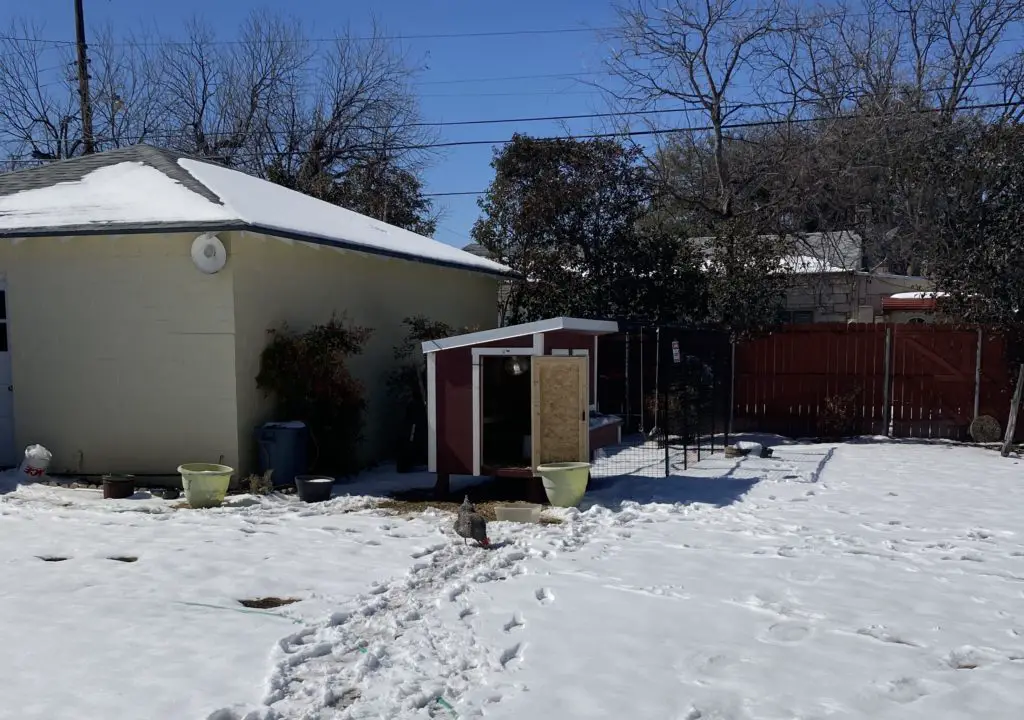Are your chickens laying their eggs in the yard? It’s funny to find an egg randomly in the yard but it can lead to some issues if you’re not sure when the egg was laid. You also don’t want a skunk or raccoon to find out that eggs are laying around your yard and become a nuisance.
Chickens will lay their eggs in the yard instead of nesting boxes when there are issues with the nesting boxes, such as insufficient space, lack of ventilation, or the coop is too hot. In addition, new layers (pullets) and chickens that are excited or stressed can lay eggs in the yard.
Keep reading to learn more about why chickens will lay eggs in the yard.
1. Young Chickens are New to Laying
When young chickens, or pullets, first start to lay eggs it’s not usual for them to lay their eggs is random places, including the middle of the yard. Because egg laying is a new bodily function, the young chickens need to learn where to lay the eggs.

Pullets can be taught to lay their eggs in the nesting boxes by placing wooden or ceramic false eggs in the nesting boxes. You can also place golf balls in the nesting boxes to encourage young chickens to lay there. When chickens see eggs in a nest they assume that it’s a safe place for them to lay their eggs too.
Since pullets will not lay every day but rather every 3 days or so, it might take a few days (or weeks) to get your entire flock on the same page on where to lay their eggs. As the pullets become accustomed to laying they should become more regular at laying in their nesting boxes.
In general, the following breeds will start laying within these age intervals:
| Breed | Age at Lay (weeks) |
| Ameraucana | 18 – 22 |
| Australorp | 24 – 26 |
| Brahma | 24 – 26 |
| Cochin | 24 – 26 |
| Dominque | 24 – 26 |
| Easter Egger | 24 – 26 |
| Faverolles | 24 – 26 |
| Marans | 24 – 26 |
| Orpington | 24 – 26 |
| Plymouth Rock | 24 – 26 |
| Sussex | 24 – 26 |
Two of my Barred Plymouth Rocks started laying at exactly 24 weeks, with the remaining chickens laying over the course of the next 2 weeks.
2. Hot Weather
In hot weather, chickens are more prone to lay their eggs outside the nesting boxes and in the yard or under bushes. Both free range and confined chickens will do this in hot weather.
The weather begins to get warm for chickens at 85 degrees F, which is when they can start to pant. High temperatures, especially when they are accompanied by high humidity, can be dangerous for chickens.
When the temperature is hot outside, it can be even more hot inside the chicken coop, which is usually where the nesting boxes are located. Chickens will lay their eggs in the yard or under a cool bush during hot weather because they don’t want to go inside the coop.
If you notice your chickens are laying eggs outside the nesting box when the weather is hot, then that’s your cue to make some adjustments for your flock. For starters, make sure your chicken coop is getting sufficient air flow to keep the coop as cool as possible. Open the doors and windows to allow for air circulation which helps to cool the coop. If your coop is not located in the shade, add a tarp to help keep the sun off the roof of the chicken coop. Consider adding a tarp over the chicken run too and set-up fans in both the coop and run.
Check out 9 Ways to Keep Chickens Cool During Summer for more ideas on keeping your flock cool.
3. Too Far from the Nesting Boxes
When chickens free range, they can end up too far from the nesting box when the urge to lay happens, resulting in them laying the egg in the yard.
If you have a large backyard, your chickens might not be able to make it back to the nesting boxes in time. This can also happen during hot weather when chickens will get too warm walking the distance back to the chicken coop and will find a cool, shady spot to lay their egg in the yard.

To prevent your chickens from laying eggs randomly in the yard when they free range too far from the chicken coop, set-up temporary nesting boxes closer to your chickens. You can use a milk crate or moving box turned on its side. Add some bedding material and a false egg to encourage chickens to lay there instead of in the yard.
4. Crowded Nesting Boxes
Another reason why chickens may lay their eggs in the yard is because there are too many chickens per nesting box.
In general, you should have 1 nesting box for every 4 to 5 chickens. Crowded nesting boxes can cause stress among the chickens in your flock so make sure you provide them with enough places to lay their eggs.
If you have a broody hen or chickens from a broody breed you might consider adding more nesting boxes to take into account the chickens that will spend hours sitting in the nesting boxes. Some chickens will crawl into a nesting box with a broody hen to try to kick her out so she can lay her egg. If one chicken doesn’t leave the nesting box, this can lead to fights and broken eggs.
Here are some of the chicken breeds that are more likely to go broody and spend a significant amount of time in the nesting boxes:
| Broody Breeds of Chickens |
|---|
| Araucana |
| Aseel |
| Australorp |
| Brahma |
| Cochin |
| Delaware |
| Easter Egger |
| Jersey Giant |
| Malay |
| Orpington |
| Plymouth Rock |
| Silkie |
| Sumatra |
| Sussex |
Just like people, chicken have personalities so not all chickens that are in these breeds will necessarily go broody. They are just more likely to go broody than chickens from other breeds.
There is usually one box that the chickens will prefer to lay in since they view a nest full of eggs as a safe place to lay. Collect eggs frequently to encourage the chickens to use the other nesting boxes instead of the one. You can also try false eggs, but my chickens caught on to this trick a long time ago and have rolled all the wooden eggs out of the coop and into their run.
5. Insufficient Space in Nesting Boxes
Chickens will choose to lay their eggs in the yard if the nesting boxes themselves are too small.
A nesting box should be large enough for a chicken to sit in the box and comfortably lay an egg. If it’s too large, some hens don’t feel like it’s secluded enough and will seek out a more private nesting location elsewhere. Some chickens will lay eggs in the yard under bushes or other secret places if they don’t feel comfortable in their nesting boxes.
In general, a nesting box should meet these size requirements:
| Type of Breed | Nest Box Dimensions (long x high x deep) |
| Regular | 12″ x 12″ x 12″ |
| Heavy | 14″ x 14″ x 12″ |
| Bantam | 10″ x 12″ x 10″ |
Nesting boxes should be appropriately sized for the type of chicken breed that you are raising so take this into consideration when you are building or buying your chicken coop. Most chicken coop kits or instructions for building coops online will give you the nesting box dimensions, so just check them against the table above and you should be good.
6. Dirty Nesting Boxes
If nesting boxes are excessively dirty, chickens will lay their eggs outside the chicken coop and in random places throughout the yard.
As a general rule, chicken coops should get a deep clean twice a year. This means replacing bedding, cleaning off roosting bars, and making sure there are no insects living in the coops.
If you notice there is an odor coming from the coop, such as an ammonia, or see there are many flies, then it’s time to clean the coop, regardless if it’s the twice a year coop cleaning time. Make sure the nesting boxes are clean and remove any chicken poop promptly. This will also ensure that your eggs will be clean when they are laid.
Read 6 Ways to Naturally Get Rid of Flies Around the Chicken Coop for more ideas on how to reduce the fly population in and around the chicken coop.
I really like using nesting pads in my nest boxes. The chickens can’t easy kick out this material and it provides a soft landing for the eggs. Check out my Recommendations page for a quick review of the nesting pads I use for my chicken coop.
7. Too Drafty
If the chicken coop and nesting boxes are too drafty, chickens will find a warmer place to go lay their eggs.
While ventilation is critical to a chicken coop, too much of a good thing can cause health issues for your chickens’ sensitive respiratory system. In addition, drafts can make them uncomfortable when laying eggs.
Some chickens are able to quickly lay an egg, while it takes others several minutes or even hours prepping the nesting materials, turning around many times in the box, picking at bedding and putting it on their backs, and other behaviors before they finally lay their egg. If the nesting box area is drafty with a cold breeze and there’s a more comfortable area in the yard or under a bush, the chickens will go there to lay their eggs.
8. Not Enough Privacy
Some chickens require more privacy than others when they lay eggs and will seek out more secluded locations to lay.
Nesting boxes should be in a quiet location and allow for the chickens to lay their eggs without an audience.

I have some hens that can pop out an egg in the middle of the coop, in the middle of the run, or even in the middle of the yard. However, I have other hens that require just the right conditions before they lay. It’s best to place your nesting boxes in a quiet area, away from barking dogs, revving engines, or any other distracting noises to encourage your hens to lay in the boxes instead of in the yard.
9. Nesting Boxes are Too Bright
Nesting boxes need to be dimly lit to encourage chickens to lay eggs there. If there is too much light in the nesting boxes, this can lead other chickens to peck at a laying hen’s vent since it’s more visible. When a hen is getting picked on while in the nesting boxes, she’s more likely to find a more private place to lay her eggs.
If the nesting boxes in your coop are too bright, consider stapling a light piece of fabric to the opening of the nesting boxes. Tack the curtain open for a few days to let the chickens know they can still enter the nesting boxes. After they have determined the curtain is not a threat, you can remove the tack and totally close the curtain on the nesting box.
10. Chicken is Excited
Sometimes a chicken can get so excited that the egg pops out when she is walking or running through the yard.
I have seen this happen more than once with my chickens. On one occasion, I opened the big door on the chicken coop to let the girls out to free range, which always gets then excited. One hen jumped out of the coop, landed on the ground, and out popped an egg! Another time, a chicken was running to get treats from me in the yard and an egg popped out.
Be careful to not get your chickens too excited since it’s possible for them to have heart attacks. But as long as it’s good excitement, like getting treats or being let out into the yard to free range, it should not be a concern if they pop out an egg randomly in the yard.
11. Chicken is Stressed
If a chicken has experienced a stressful event, this could cause them to lay an egg prematurely before they are able to make it to the nesting box.
Although this is rare, it can happen. If a chicken was frightened by a predator, like a dog or a hawk, that nearly caught the chicken, her body can be so stressed that the egg will pop out, sometimes without her even realizing.
Make sure your chickens are protected at all times so they do not become victim to predation. In addition, make sure your chicken coop is a stress-free area for your hens. If the chicken coop area is stressful, they will seek out another place to lay their eggs.
Try to locate your chicken coop away from barking dogs or animals that could try to get into the coop. Be aware if your coop is located next to a noisy road or garage. It’s understandable that most of us raising backyard chickens don’t live in perfectly quiet neighborhoods, but try to locate your coop in an area of your yard where the chickens can have some peace throughout the day (and night). Take into account that if dogs, raccoons, or any other animal are trying to get into the coop, your chickens will be stressed and they will find a less stressful area to lay their eggs.
12. Coop Door is Closed
The last reason why your chickens might be laying eggs in the yard is that they are not able to enter their coop.
This is one of those obvious reasons, but something you should consider. I have let my chickens out of the coop to free range during the day and their door has blown shut, preventing them from getting back into the coop.
If you have a similar set-up, prop something up to keep the door open so that the chickens can access their coop throughout the day to eat, drink, lay eggs, and escape bad weather and predators.

In summary, here are 12 reasons why your chickens are laying eggs in the yard, instead of the nesting boxes:
- Young chickens are new to laying
- Hot weather
- Too far from the nesting boxes
- Crowded nesting boxes
- Insufficient space in nesting boxes
- Dirty nesting boxes
- Too drafty
- Not enough privacy
- Nesting boxes are too bright
- Chicken is excited
- Chicken is stressed
- Coop door is closed

